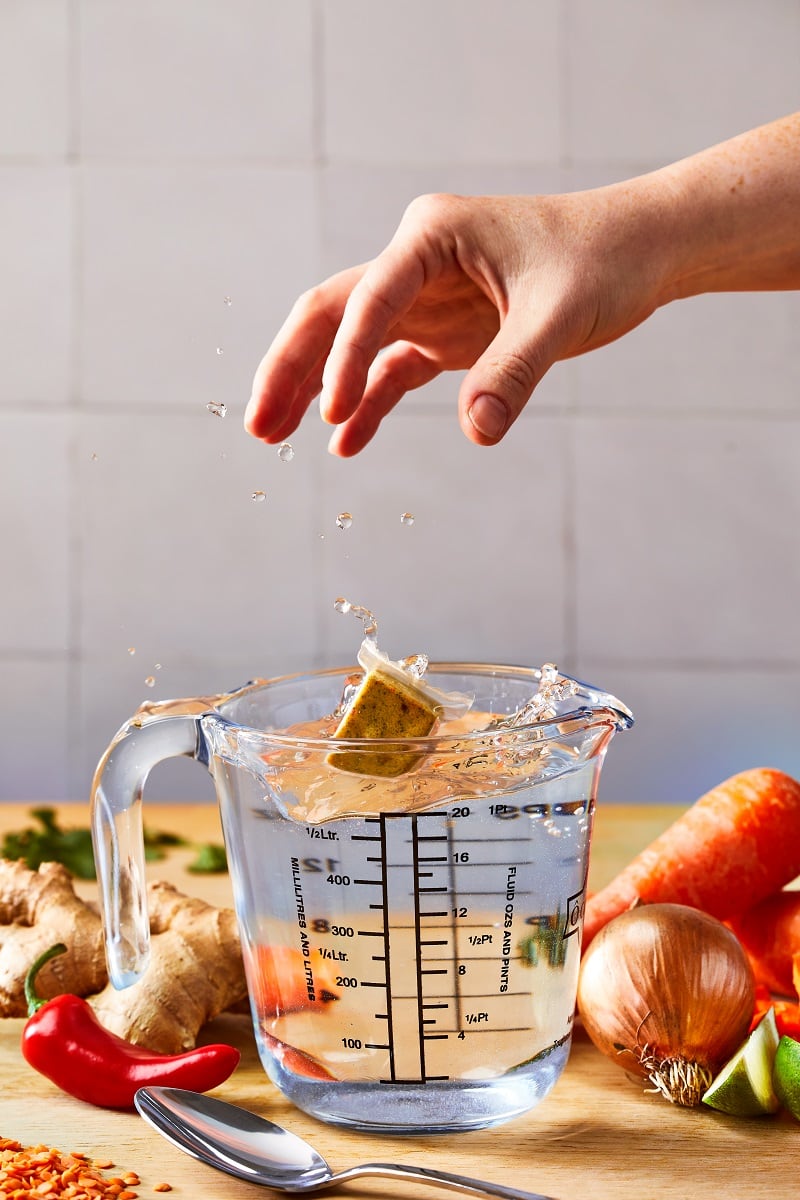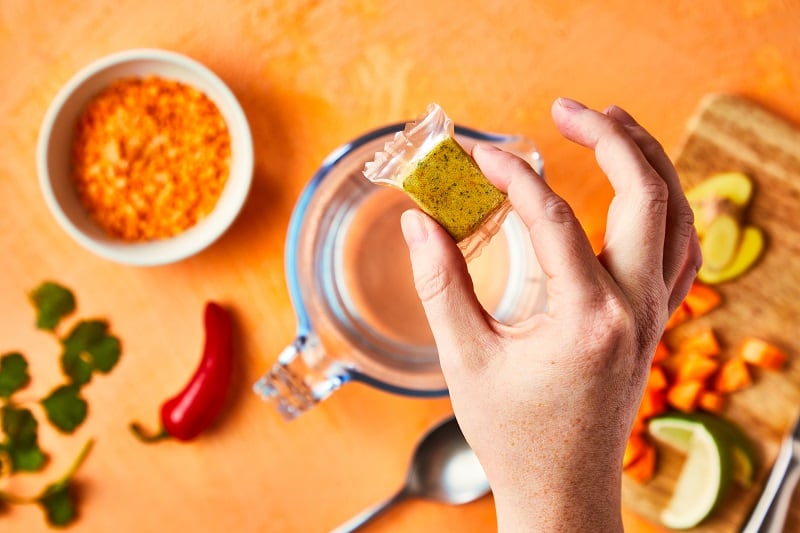Gousto is trialling a world-first edible packaging solution, as part of its efforts to continue reducing plastic packaging in its recipe boxes.
After 15 years of research and one year of development, the stock cube wrapper is the world’s first edible packaging to be made from pea protein. Created in partnership with Xampla, a spinout from the University of Cambridge, the stock cube will be trialled in Gousto recipe boxes this month.
The edible packaging is made by engineering and drying a pea protein material into sheets that have the same benefits as plastic, being able to preserve the food’s flavour and shelf life, but with none of the packaging waste. What’s more, the material is also vegan and gluten free.

Home cooks who take part in the trial will enjoy the vegetable stock cube in Gousto’s Indian Spiced Carrot & Lentil Soup recipe, by simply dissolving the stock cube and its packaging in hot water.
Following its first full year of profitability in 2020, the recipe box company recently became a certified B Corporation, joining a global community of businesses that are committed to growing the right way for people and the planet, including Xampla.
This was achieved in part by Gousto’s ongoing work to reduce plastic packaging in their recipe boxes. Last year the business cut plastic by 50% in their boxes by switching to more cardboard packaging and launching the Eco Chill Box, an innovative insulator made of recycled cardboard, that keeps ingredients fresh in boxes.
A further 17 tonnes of plastic could be saved by Gousto annually if the new edible stock cube packaging is rolled out in full to customers in the future, the company estimated.
The edible stock cube packaging is being trialled to replace Gousto’s existing stock mix sachets, for a packaging-free stock that’s full of flavour.
Gousto CEO and founder Timo Boldt said; “At Gousto, our purpose is to build products that have a positive impact on people and the planet and we invest in innovations that will help us get there. We are so proud of our Eco Chill Box and the significant amount of plastic we cut from our boxes as a result. This partnership with Xampla is another super exciting step towards reducing plastic packaging even further.”
We’re excited to see what our customers think, and to continue paving the way for innovative sustainable solutions in our industry.”
No impact on taste or cost, though shelflife impacted
The edible packaging has zero impact on the taste of the stock, the company added. There is a compromise on shelf life compared to a supermarket stock cube, it told FoodNavigator. But Gousto's model meals are typically consumed within the week of delivery so it will not impact customers.
Xampla CEO Simon Hombersley said; “This world-first edible pea protein packaging is the product of 15 years of University of Cambridge research, and over a year of development with the Gousto team. We’re so excited to be working with the recipe box company to offer more sustainable alternatives to plastic, and hope this marks the beginning of significant change within the industry and many more innovative packaging solutions in the future.”
The edible packaging is available now for Gousto customers to choose to add to deliveries from 6th-12th November, as part of the Indian Spiced Carrot & Lentil Soup recipe. The box price will stay the same, it further revealed, adding its next step will be "figuring out how to apply this technology to optimize customer experience and in what applications would they like to use it".
Xampla said its pea protein material performs like conventional plastic but is fully biodegradable. The material has applications across many single-use plastic products, and one of its core launch products is microcapsules. It added the R&D was inspired by upcoming regulation from the European Chemicals Agency.
“Plastic fragrance microcapsules are set to be regulated under the ECHA microplastics ban which will prevent the release of 500,000 tonnes of microplastics over 20 years,” it said. “As they are too small to be collected at end of life they present a real environmental challenge that needs to be overcome. Yet, whilst necessary, this regulation puts the known-and-loved consumer experience of fresh scent bloom and longevity in our home and personal care products at risk.”
It added: “Not only is this a breakthrough for the planet, it will also help to futureproof brands against further regulatory changes surrounding microplastics.”





